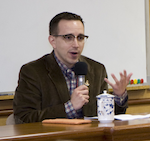Over at my personal blog a few weeks back, I wrote a lengthy post in response to one at Barbara’s Buddhism Blog about the 106th Faculty Research Lecture at UCLA, which was delivered by Gregory Schopen, chair of the Department of Asian Languages and Cultures at the university. In that lecture, Schopen presented on some of his findings from studying Indian Buddhist epigraphy which suggest that “the predominant ideology [in early monasteries] was not…particularly ascetic, and certainly not averse to the accumulation of wealth.” Barbara took issue with this, referring to Schopen’s findings as “mis-education” and possibly “the dumbest explanation of Buddhism [she has] ever seen.” In response, I pointed out that Schopen’s work is based on hard archaeological evidence, and also highlights certain inaccuracies and problematics in modern Buddhist Studies.
In reading Barbara’s post and responding to it, I was struck that it would have been helpful for both of us to have been able to actually hear Schopen’s lecture beforehand. (Barbara was reacting to an article about the lecture and not the lecture itself, and I was responding to her based on my knowledge of Schopen’s past research.) Well, UCTV has given us the opportunity to catch up by posting the full video version of Schopen’s lecture online at YouTube.
Take a look at “The Buddha as a Businessman: Economics and Law in an Old Indian Religion”. It’s a fascinating, provocative, challenging, and relevant stuff–scholarship that practitioners would do well to be aware of. And, as I said to Barbara, while the findings of modern Buddhologists like Schopen might burst our idealistic bubbles, that doesn’t have to be a bad thing. It strikes me that we as modern Buddhist pracitioners can listen to and learn from findings like those of Schopen’s, and then proceed with a better sense of what in our traditions can be changed and what we should take great care to preserve. It’s a matter of perspective: to borrow some terms from Lama John Makransky, the academic study of Buddhism doesn’t have to present us with just problematics, but it can offer possibilites as well.
All of that said, it must be acknowledged that there are still limits to what we can know for sure about the character of early Buddhism. Scholars can and do overreach, and sometimes put too cynical a spin on their findings. And I also think that whenever scholars or practitioners put things in “either/or” terms, they’re probably on the wrong track. Like all great religions, Buddhism has been made up of a pretty fascinating collection of individuals and communities. (Which is one reason why I think my old prof Reggie Ray is quite right indeed, for example, to advocate in his book Buddhist Saints in India: A Study in Buddhist Values and Orientations that we speak of early Buddhism as being comprised of at least three groups: the laity, the monastics involved in local politics and economics, and the forest renunciants devoted to practice. We can’t say all early Buddhists were moguls and power-brokers, and we can’t say they were all pure practitioners either.)
So, behold someone who has put in a mind-boggling amount of hard work so that we all might better understand the history of Buddhism. And then let’s find the possibilities.






Read 0 comments and reply